Online event
24th June 2022 - 9:30 am to 11:00 am
Exploring challenges and opportunities of econmics in Protected Landscapes
We will explore the economic challenges and opportunities faced by protected landscapes around climate change, tourism and land-use, and exploring innovative solutions to these topics including the bioeconomy, nature tourism and green finance.
Key topics/themes include:
• Land use change: farm productivity / tree planting Vs food production Vs regenerative agriculture / nature tourism
• Rising costs in a changing world: how the bioeconomy is leading innovation in rural communities (net-zero food production / breaking the dependency on petro-chemicals)
• The risks and opportunities of public and private investment in green finance / carbon credits to support sustainable land use practices
Site Visits
Vattenfall Windfarm and Peatland Restoration
16th June 2022
Vattenfall Wind Farm and Pealtland restoration in Partnershipwith Natural Resources Wales
Vattenfall’s Pen y Cymoedd wind farm has a large scale forest to bog habitat restoration programme currently taking place. The habitat management area covers over 1400 ha of NRW forest estate around the wind farm, with the restoration being implemented by NRW on behalf of Vattenfall. The site visit will take us to some of the HMP management units at various stages of restoration (from over two years ago to work carried out last winter) and describe the various restoration techniques being used including ground smoothing and stump flipping. Key challenges to forest to bog restoration will be discussed as well plans for monitoring and anticipated wider benefits to the local area.
River Esk Catchment, North Yorkshire
17th June 2022
The Natural Environment Investment Readiness Fund (NEIRF)
The North York Moors National Park Authority (NYMNPA) was one of 29 organisations in England to secure funding from the Defra funded Natural Environment Investment Readiness Fund (NEIRF) to develop a nature restoration project. NYMNPA’s project will focus on developing a model for restoring and creating habitats such as species-rich grasslands, riparian woodland and riverside meadows at a catchment scale. Enhancing ecosystem services will also be a prominent part of the project, with focus on carbon sequestration and water quality improvements.
The NEIRF is led by Palladium and NYMNPA, in partnership with Esk Valley Farmers Group (EVFG), Natural Capital Research and the Environment Agency. The project runs parallel to ‘Revere’, a UK-wide collaboration between National Parks and Palladium that aims to catalyse private finance into nature restoration at scale across the National Park network. The project will explore the feasibility of funding nature recovery in the Esk Valley with private finance. No other projects in the UK are currently working with farmers on this scale to better understand the private financing opportunity in managing land for improved environmental outcomes.
The aim of the project is to test a theory that nature restoration in the Esk Valley can deliver long term economic returns for land managers, by generating revenue through sale of ecosystem services. The project will be undertaken in three phases and will operate until autumn 2022.
We will visit a view-point of the catchment that will promise beautiful vistas and give members a chance to see the Esk valley from above. Here, Chris Watt (Project Officer) will discuss the NEIRF project, its achievements so far, as well as future challenges and opportunities. Fraser Hugill, the representative for the Esk Valley Farmers Group, will also discuss his work so far with land managers investigating soil health and carbon sequestration within the NEIRF project. This hopes to ignite discussion amongst the group into the future of private investment in green finance and carbon credits.
River Esk Restoration Project (Water Environment Grant)
This was an ambitious “catchment scale” project that worked to address a number of issues in order to restore the River Esk through farm infrastructure grants and targeted 1:1 farm advice. A total of 33 landowners were engaged with to deliver farm improvement works across the Esk valley. We will visit a handful of these farm locations to view the capital works carried out throughout this 3-year project, including; buffer creation and tree planting, farm yard improvement works with ‘clean and dirty water’ separation techniques, and an innovative large-scale ‘soft engineering’ bank restoration project.
We will cover 3 different sites across the catchment where an overview of each project will be provided by Project Officer Chris Watt, and members will have the opportunity to ask any questions related to the work delivered.
The Esk Freshwater Pearl Mussel Project
Significantly, the Esk is the only river in Yorkshire home to the rare and protected freshwater pearl mussel (FPM), and one of only thirteen rivers in the whole of England to support this species. A small number of mussels are still left (~1,000 individuals), however, the population is ageing (majority are over 80 years old) with no new juvenile recruitment occurring. A steering group exists in partnership between the Environment Agency, National Park, Freshwater Biological Association and Yorkshire Water that has a long-term strategy in place to help protect this sensitive species. The strategy aims to; continue the captive breeding programme in Windermere to ensure a healthy population of introduced FPM to the Esk, restore water quality and sediment levels for FPM survival, have identified and secured release sites for FPM release, ensured sufficient suitable habitat exists throughout the local catchment that will support widespread FPM recruitment and have successful recruitment from Esk mussels by 2040.
We will visit the planned pilot release site in Lealholm where Project Manager Allison Pierre (Environment Agency) will give an overview of the history of the Esk’s FPM, as well as our ambitions and plans to conserve the last of Yorkshire’s population.
Meeting Place:
Danby Lodge National Park Centre
Lodge Lane
Danby
Whitby YO21 2NB
Event Chair
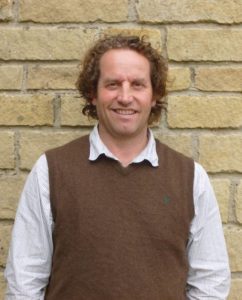
Neil Heseltine
Farmer and Chair
Yorkshire Dales National Park Authority
Neil Heseltine is a fourth generation farmer and was educated at Ermysteds Grammar School, Skipton and Seale Hayne Agricultural College. He spent time travelling and working on farms in New
Zealand and Scotland before returning to Hill Top Farm, Malham, in the Yorkshire Dales National Park where he was born and brought up. He now farms Hill Top with his partner Leigh and they have a young daughter, Violet. The farm comprises 1100 acres; the majority of which is in Countryside
Stewardship and this includes land rented from the National Trust. In 2003, as part of a conservation
grazing scheme he introduced 20 Belted Galloway cattle to the farm. This proved to be a defining time for Neil in terms of ethos and mind-set, as he sought more sustainable and environmentally friendly production methods. He has recently been closely involved with the National Trust in a trial payments by results scheme and was awarded the National Trust’s “Farming with Nature” award in 2019.
Neil was a member of the National Park England [NPE] Future of farming post Brexit task & finish group in 2016/17 who helped prepare the document ‘Farming in the English National Parks’ which enables NPE to make proposals to DEFRA on the future of farming in the English National Parks and he recently gave evidence to the North Yorkshire Rural Commission.
A keen rugby player and cricketer, he is a member of Malham Parish Council and is a former chairman of the Malham Show. Neil was appointed Chair of the Authority in June
2020 having served as Deputy Chair since June 2019
Event Panel
Prof Ian Graham
Director of Bio York
University of York
 an Graham’s interests include how plants make and breakdown various metabolites, how these processes are controlled and how they impact on plant growth. He has used biochemical genetics to dissect the main metabolic pathways controlling oil mobilisation in Arabidopsis seed (Graham, 2008) provided new insight into how a lipid based signals (Dave et al., 2011) and light quality (Vaistij et al., 2018) control seed germination. He has used similar approaches to investigate the synthesis of bioactive compounds in two of the world’s major medicinal crops. This has led to new understanding of how genome rearrangement has shaped the evolution of plant metabolism. The discovery of a 10 gene cluster responsible for the production of the anti-cancer compound noscapine in opium poppy provided the tools for molecular breeding of new commercial varieties (Winzer et al., 2012).
BioYork is a University of York-led initiative focused on using our world class research and knowledge base to drive the development of UK bio-based industries to deliver growth, jobs and environmental benefits.
Global consumption has driven demand for food, energy and materials to an all-time high. At the same time, the need and legal obligations to mitigate climate change requires a shift from petrochemical based products and energy sources to low carbon sustainable alternatives. Seizing this opportunity will require a step change in our current thinking, and our approach.
BioYork logo
BioYork is a world leader in the bioeconomy and collaborates with companies across a number of sectors, bringing together regional and national research and innovation capability across Technology Readiness Levels.
an Graham’s interests include how plants make and breakdown various metabolites, how these processes are controlled and how they impact on plant growth. He has used biochemical genetics to dissect the main metabolic pathways controlling oil mobilisation in Arabidopsis seed (Graham, 2008) provided new insight into how a lipid based signals (Dave et al., 2011) and light quality (Vaistij et al., 2018) control seed germination. He has used similar approaches to investigate the synthesis of bioactive compounds in two of the world’s major medicinal crops. This has led to new understanding of how genome rearrangement has shaped the evolution of plant metabolism. The discovery of a 10 gene cluster responsible for the production of the anti-cancer compound noscapine in opium poppy provided the tools for molecular breeding of new commercial varieties (Winzer et al., 2012).
BioYork is a University of York-led initiative focused on using our world class research and knowledge base to drive the development of UK bio-based industries to deliver growth, jobs and environmental benefits.
Global consumption has driven demand for food, energy and materials to an all-time high. At the same time, the need and legal obligations to mitigate climate change requires a shift from petrochemical based products and energy sources to low carbon sustainable alternatives. Seizing this opportunity will require a step change in our current thinking, and our approach.
BioYork logo
BioYork is a world leader in the bioeconomy and collaborates with companies across a number of sectors, bringing together regional and national research and innovation capability across Technology Readiness Levels.
Mike Butterick
New Zealand Farmer
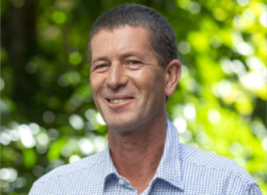 Mike is a husband to Rachel and father of four children aged 18 to 25. He has farmed all of
his working life, after growing up on an irrigated farm in the South Island. Rachel and Mike
currently run an irrigated finishing farm in conjunction with an extensive hill country
property in the Wairarapa, North Island.
Mike is currently the Chair of the Wairarapa Federated Farmers Meat and Wool Sector. He is
also very involved with the lobby group ‘Fifty Shades of Green’ which has been outspoken
about the planting of productive farmland in trees, by carbon emitters and speculators.
He is on the ‘Wings Over Wairarapa’ board that attracts 20,000—30,000 attendees to the
Wairarapa bi-annually.
He was also the National Party candidate that contested the 2020 New Zealand General
Election, although unsuccessful,he is still very involved with the Party and sits on the
Agriculture Policy Group
Mike is a husband to Rachel and father of four children aged 18 to 25. He has farmed all of
his working life, after growing up on an irrigated farm in the South Island. Rachel and Mike
currently run an irrigated finishing farm in conjunction with an extensive hill country
property in the Wairarapa, North Island.
Mike is currently the Chair of the Wairarapa Federated Farmers Meat and Wool Sector. He is
also very involved with the lobby group ‘Fifty Shades of Green’ which has been outspoken
about the planting of productive farmland in trees, by carbon emitters and speculators.
He is on the ‘Wings Over Wairarapa’ board that attracts 20,000—30,000 attendees to the
Wairarapa bi-annually.
He was also the National Party candidate that contested the 2020 New Zealand General
Election, although unsuccessful,he is still very involved with the Party and sits on the
Agriculture Policy Group
Dr Zoe Balmforth
Pivotal earth
Pivotal Earth
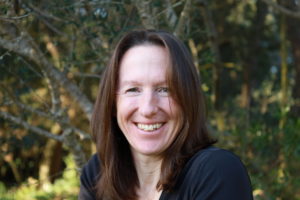 oe, a PhD ecologist, has spent 25 years working on solutions to biodiversity loss. She has carried out large-scale biodiversity monitoring in a wide range of ecosystems, including Africa, S America and Europe and routinely engages with the largest companies in the world – helping them to assess, reduce and disclose their impacts on nature. She is also a former British diplomat and has experienced the public policy angle to environmental issues.
oe, a PhD ecologist, has spent 25 years working on solutions to biodiversity loss. She has carried out large-scale biodiversity monitoring in a wide range of ecosystems, including Africa, S America and Europe and routinely engages with the largest companies in the world – helping them to assess, reduce and disclose their impacts on nature. She is also a former British diplomat and has experienced the public policy angle to environmental issues.
Andrew Sowerby
Regional Manager – West
Pryor & Rickett Siviculture
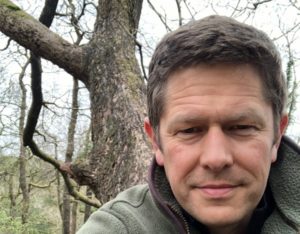 Andrew has 15 years’ experience managing extensive public sector forests in Wales. Having become a chartered forester in 2006, he is an active member of the ICF, and held positions of secretary, vice chair and lead for the 2014 winter conference in Machynlleth. In 2017, Andrew was elected to ICF Council, representing the Wales Region. He also holds the position of Finance Officer on the Executive Committee and became a Fellow of the Institute in 2018.
Prior to joining Pryor & Rickett Silviculture in 2016, he developed Forestry Commission GB’s guidance for producing forest design plans and led national forest planning on the Welsh Government Woodland Estate. Most recently, he led a successful harvesting programme in South Wales to mitigate the effects of Phytophthora ramorum in larch. He delivered over 400,000 m3 of timber per year to market, leading a team of 15 staff in collaboration with customers holding 5-year long term standing and roadside contracts.
Andrew leads a group of volunteers in Wales that supports tree planting in rural Uganda. He values the global impact that local forests have on the economy and environment when they are sustainably managed. Andrew is a Welsh speaker.
Andrew has 15 years’ experience managing extensive public sector forests in Wales. Having become a chartered forester in 2006, he is an active member of the ICF, and held positions of secretary, vice chair and lead for the 2014 winter conference in Machynlleth. In 2017, Andrew was elected to ICF Council, representing the Wales Region. He also holds the position of Finance Officer on the Executive Committee and became a Fellow of the Institute in 2018.
Prior to joining Pryor & Rickett Silviculture in 2016, he developed Forestry Commission GB’s guidance for producing forest design plans and led national forest planning on the Welsh Government Woodland Estate. Most recently, he led a successful harvesting programme in South Wales to mitigate the effects of Phytophthora ramorum in larch. He delivered over 400,000 m3 of timber per year to market, leading a team of 15 staff in collaboration with customers holding 5-year long term standing and roadside contracts.
Andrew leads a group of volunteers in Wales that supports tree planting in rural Uganda. He values the global impact that local forests have on the economy and environment when they are sustainably managed. Andrew is a Welsh speaker.
Jerry Langford
Public Affairs Manager
Woodland Trust
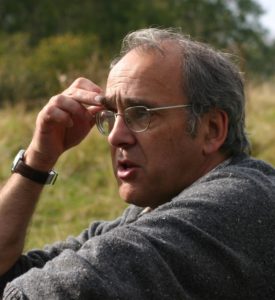 Jerry has worked for Coed Cadw – the Woodland Trust in Wales – for many years, initially acquiring and managing woods across Wales for the Trust, then moving into team management. He is now the Trust’s Public Affairs Manager in Wales, focusing on policy advocacy and campaigning and engaging with other organisations, the Welsh Government and NRW. Current priority topics include agroforestry and farm trees and woodland; tree protection and urban tree cover. He is a Chartered Environmentalist (MIEEM, CEnv) and lives in Ceredigion, working from home or from the Trust’s office in Cardiff. On Twitter @JerryLangford1
Jerry has worked for Coed Cadw – the Woodland Trust in Wales – for many years, initially acquiring and managing woods across Wales for the Trust, then moving into team management. He is now the Trust’s Public Affairs Manager in Wales, focusing on policy advocacy and campaigning and engaging with other organisations, the Welsh Government and NRW. Current priority topics include agroforestry and farm trees and woodland; tree protection and urban tree cover. He is a Chartered Environmentalist (MIEEM, CEnv) and lives in Ceredigion, working from home or from the Trust’s office in Cardiff. On Twitter @JerryLangford1
Rethink – Economy resources
Videos
Sorry, we couldn't find any posts. Please try a different search.
Share your film to our resources
You can share your own related film to our website here. Share a film hosted on YouTube or Vimeo. If it's not already online, we will upload it to our Vimeo channel.
Links
Sorry, no links for this theme.
Downloads
Sorry, no downloads for this theme.
